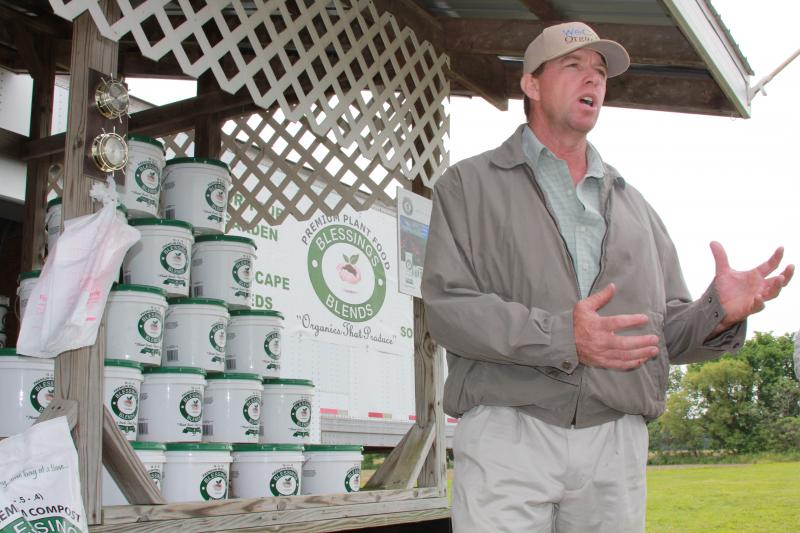Odors, not nitrate run-off, are Sussex County Council's main concern as it considers a conditional use application for a compost business south of Milford, a state environmental scientist said during a hearing on the project.
In 2005, owner Bruce Blessing began his compost operation on about 30 acres a few miles from Fowler Beach. His business has been the source of odor complaints and Department of Natural Resources and Environmental Control violations since 2012.
Brian Churchill, an environmental scientist with the Department of Natural Resources and Environmental Control, spoke during a public hearing April 25 on Blessing Greenhouses and Compost's application to allow the business to continue operating its Draper Road facility.
“Are there things we should be looking at that you could make suggestions?” asked Councilman George Cole. “You're the experts on the environment, I'm not.”
Churchill said testing of groundwater wells on Blessing's site has revealed little impact on area groundwater and surface water.
“My opinion, at this point, is the facility has minimal impact on groundwater, minimal impact on surface water and Slaughter Creek,” he said.
Churchill said based on water tests, most of the nitrate and other water contamination likely comes from nearby chicken houses and other agricultural activities.
“The nitrate found in testing unlikely comes from Blessing's,” he said. “My opinion is the main concern should be the odors.”
Churchill added that previous meetings have recommended reducing odors by 90 percent. But other than a sniff test that can clearly detect foul smells emitting from the property, he had no other recommendation on how the county should address odor complaints.
Stinky business
About a dozen neighbors attended the hearing to let council know about the smells.
“Over the years, it's gotten really bad. It's putrid,” said Geraldine Maher, a neighbor who lives on Draper Road.
“This mess stinks,” said neighbor Alan Bennett. “Do you want this in your backyard? I don't think any of you do.”
Sharon Stevens lives about a quarter mile away and said she has no problem with Blessing's business proposal. The odors are a different matter.
“So far what he has done with the facility has been complete negligence,” she said. “I have not seen anything different with Mr. Blessing that would prove he's going to run his business any different.”
DNREC's Churchill also said the facility has produced foul odors. “I've been there when it's pretty bad, but it's not as bad as it once was,” he said.
Carol Tani said she likes her home, but foul odors and bugs make it unbearable at times.
“Don't let him get bigger until he fixes what's wrong. If you let him get five times bigger, you'll have five times the problems.”
William Stephens, of Stephens Environmental Consulting Inc., said Blessing plans to build seven new 11,000-square-foot covered buildings with 12-inch concrete floors capable of processing 4,000 cubic yards of compost at a time.
County violation
Blessing began his compost operation on the site of a former cannery plant. He said he assumed commercial operation was a permitted use on the land, but county officials gave the parcel agricultural, residential zoning AR1 when new land use maps were created.
Five years ago, the parcel received a zoning violation from the county, in addition to several DNREC violations issued over the years to Blessing's business.
Councilman Rob Arlett questioned why it has taken Blessing five years to apply for a conditional use permit.
“Our own county gave you a violation five years ago, and here we are,” Arlett said.
Blessing said he went to Planning and Zoning about the violation in 2012 and was told that he needed to submit a site development plan and a total comprehensive plan of the proposed facility. “I started the process. It's taken this long to develop what we needed to do. I've had the property surveyed three times,” he said.
Blessing's attorney, Tim Willard, said Blessing should have sought conditional use sooner.
“Probably a better answer is he should've moved faster,” he said. “We're here with what we've got, and we think you know what he wants to do.”
Arlett said council should discuss how a business can continue to operate for five years while in county violation – an internal issue that should be fixed at a later date.
Council also wanted some assurance that Blessing's plan to put seven covered structures on his property and a system to reduce odors will be built.
“How much is conceptual, and how much can we count on?” Cole asked. “My only concern is many times with developments we have a presentation and a lot of it is conceptual, and it can go out the door and get changed. There are certain things we can hang our hat on and grab hold of, and that's what I want to hear.”
Blessing said he intends to build his business as planned and, if approved, he would start construction on two buildings by fall 2017. A negative air system with a biofilter will help eliminate odors, he said.
“As soon as we can get through, we'd like to get started with the process,” Blessing said.
DNREC's Churchill said one mound of material on Blessing's property did contain human sewage and dead chickens – material Blessing was previously allowed to accept – but he estimated the amount is small. Blessing said he believes all human sewage and dead chickens have been processed into compost and removed from the site.
He said odors also improved in 2015 when his business stopped land applying grease and other liquid waste.
“Land application was problematic … the odor is very limited now,” he said to laughter from residents in the back of the room.
Sussex County Planning and Zoning Commission heard similar testimony during a March public hearing. The commission has not made a recommendation to council on Blessing's request for a conditional use.
Council will continue to receive written testimony for 15 days until 4:30 p.m., Wednesday, May 10. Council President Michael Vincent said the record would remain open another 15 days for written comment from either side regarding information received in the previous 15-day period. After that, the record would remain open for 15 days until June 9 for council to ask questions of staff or agencies. After a final 15 days, council may vote to add more time to gather information, said Chip Guy, Sussex County communications director.























































